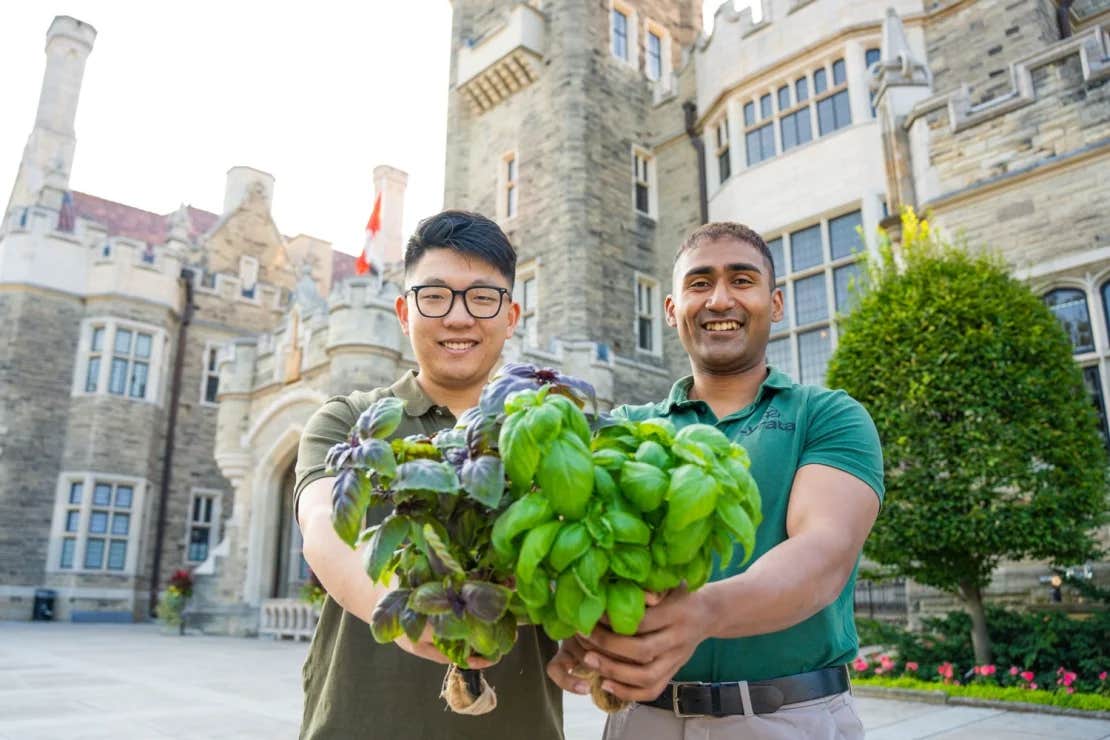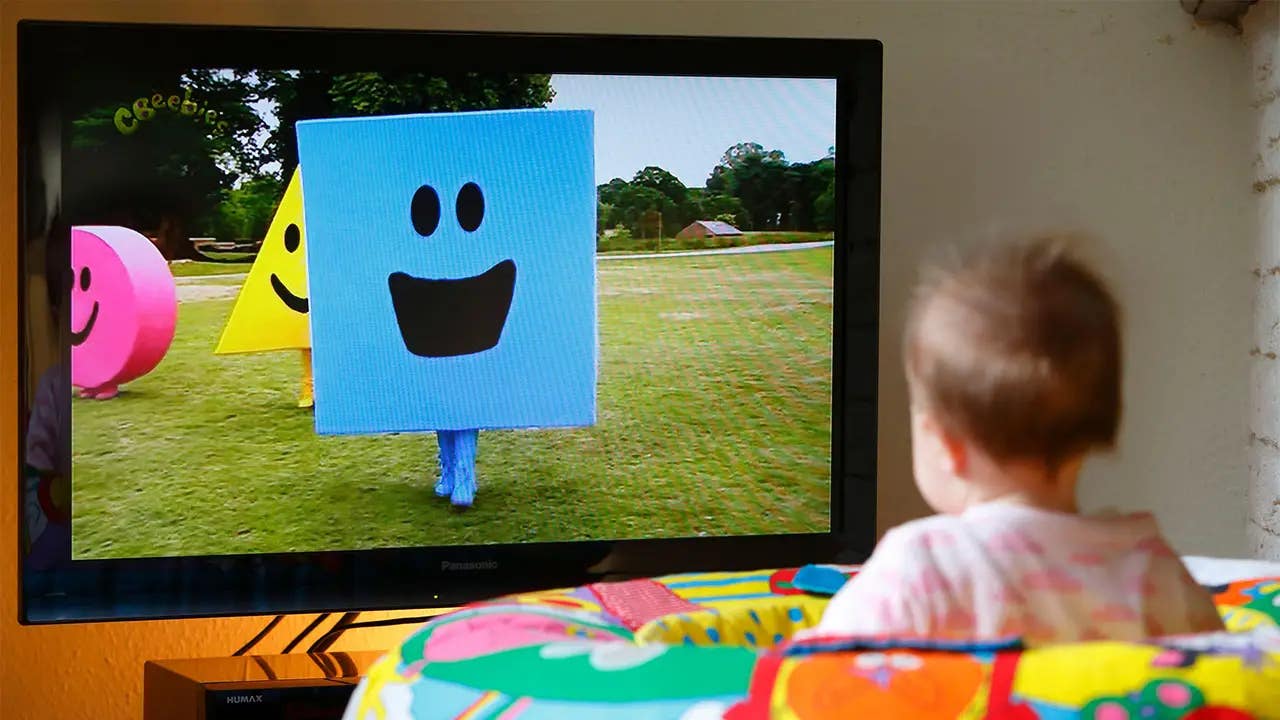3D-printed soil: Never forget to water your plants again
Lyrata, a startup from the University of Toronto, is transforming sustainable indoor farming with 3D-printed soil. Discover how they’re reducing waste and lowering carbon footprints while providing fresh, local produce.

Lyrata co-founders Leo Hua (MIE MEng 2T2, left) and Adnan Sharif (ChemE MEng student, right) with fresh basil grown at Casa Loma. (CREDIT: University of Toronto)
Adnan Sharif, a University of Toronto graduate student, found himself constantly forgetting to water his plants. This would have been a small inconvenience for most, but for Sharif, it meant potential setbacks in his lab work. At the time, he was working in a plant immunity biology lab, where plants were vital for his experiments.
Reflecting on this challenge, Sharif came up with an idea that would eventually lead to the creation of Lyrata, a Toronto-based startup transforming how fresh produce is grown for caterers and high-end restaurants.
The inspiration for his solution came from an unexpected source: his father, a mechanical engineering professor in Japan. Drawing on his father's knowledge of manufacturing materials with porous, three-dimensional structures, Sharif designed a 3D-printed soil construct capable of retaining water for over a week. “That’s how I got the idea,” Sharif explains. “I wouldn’t have to go into the lab and water the plants so often.”
This 3D-printed soil innovation became a key element in Lyrata’s success. Lyrata started small, operating out of a greenhouse on the University of Toronto's St. George campus. However, its ambitions soon grew, expanding to new locations such as U of T Scarborough and Casa Loma, a historic site in midtown Toronto.
At the core of Lyrata’s approach is hydroponics—a soil-free technique widely used in greenhouses. However, Sharif and his team saw room for improvement.
The industry-standard material used for growing plants without soil is problematic from an environmental perspective. It involves rocks mined from remote areas, which are then heated to extremely high temperatures to create a porous, chemically inert material. Not only is this process energy-intensive, but the material is also discarded after use, contributing to landfill waste.
Sharif points out, “The product that almost everyone uses today is basically the same as house insulation. It’s not sustainable, and it’s inefficient.”
Lyrata’s alternative, SmartSoil, is made from biopolymers like polylactic acid, which comes from corn. These materials can be sourced locally, and the process to create SmartSoil requires much lower temperatures than the traditional method. Unlike conventional materials, SmartSoil is reusable.
Related Stories
After each growing cycle, it undergoes a low-heat cleaning process and can be used again for up to two years. Once it reaches the end of its lifespan, it’s compostable, significantly reducing waste and lowering the carbon footprint of indoor farming.
In 2020, Sharif and his co-founders brought the concept to The Entrepreneurship Hatchery, an incubator at U of T Engineering that helps students develop their ideas into viable businesses. Through the Hatchery’s Nest process, Lyrata was introduced to business mentors, including Xavier Tang, a consultant and venture capitalist who continues to advise the company.
Over the next few years, the Lyrata team evolved, with some original members leaving and new talent joining. One key addition was Leo Hua, who played a critical role in speeding up the development of 3D-printed soil. As the business grew, the team realized that instead of selling their growth medium to other farmers, it made more sense to produce and sell crops directly.
The Hatchery provided $155,000 in seed funding in 2022, allowing Lyrata to rent greenhouse space on campus and grow their first crops. The funding also enabled the company to further refine its business model and technological offerings. One of these developments was the creation of a modular unit called SmartGrow.
This compact system works exclusively with Lyrata’s SmartSoil and is capable of growing a variety of indoor crops. The unit contains everything needed for the plants to thrive, including lights, irrigation, and growth medium.
“Our current concept is what we call farming-as-a-service,” Hua explains. “The SmartGrow unit is small enough to fit into a standard parking spot. For a flat fee, we place the unit on a client’s site and take care of everything from planting to harvesting.”
This service model offers clients a reliable, locally sourced supply of produce while eliminating the need for them to manage the intricacies of indoor farming. In a world where supply chain disruptions are increasingly common, this can be a game-changer for restaurants and caterers.
Sharif highlights the impact of these disruptions, saying, “In Canada, most of our lettuce comes from California, which has been dealing with drought and many other issues. Supply chain disruptions due to COVID-19 were also a big challenge for restaurants. At one point, the price of lettuce increased by a factor of six.”
Lyrata has already cultivated over 15 different types of crops, including basil, parsley, and mizuna, a type of Japanese mustard greens. The startup’s ability to grow a variety of crops locally means that it can offer clients more stability and cost control, even when traditional agricultural supply chains face disruptions.
The company’s relationship with U of T Engineering and its broader support network has been instrumental in its growth. One recent success was the launch of an installation at Casa Loma, made possible through a connection with a U of T Engineering alumnus.
Casa Loma’s horticulture and grounds manager, Nikol Watlikiewicz, describes Lyrata’s service as both space-efficient and user-friendly. “In a small corner of our potting shed, we were able to build two grow units that provide a good yield weekly, without having to train our staff on the complicated system,” Watlikiewicz says.
Lyrata’s growing systems offer advantages beyond sustainability. By providing an indoor, controlled environment, these systems allow users to bypass some of the unpredictability and limitations of traditional agriculture. Watlikiewicz adds, “Growing indoors gives us the stability and control that traditional agriculture does not. It’s an excellent example of how engineers can help solve the global food crisis with innovative thinking.”
Lyrata’s growth hasn’t stopped there. In August, the company launched another unit at U of T Scarborough, situated within the Harmony Commons Dining Hall. This expansion aligns with the company’s strategy to grow its crop offerings and customer base over the coming years, with continued support from The Hatchery.
The incubator’s contributions have gone beyond seed funding. The Hatchery facilitated graduate student placements through Mitacs, which provides matching funds for student research internships. It also helped Lyrata secure a $167,500 grant through the Sustainable Canadian Agricultural Partnership program, enabling the company to enhance the yield and efficiency of its SmartSoil system.
Reflecting on the journey so far, Sharif attributes much of Lyrata’s success to U of T Engineering’s unwavering support. “Whether it was getting seed funding, finding mentors, hiring work-study students, or making important connections through their alumni network, we wouldn’t be here without their support,” he says.
With its innovative approach to indoor farming and a strong foundation of academic and entrepreneurial backing, Lyrata is poised to continue growing—both literally and figuratively.
Note: Materials provided above by The Brighter Side of News. Content may be edited for style and length.
Like these kind of feel good stories? Get The Brighter Side of News' newsletter.
Rebecca Shavit
Science & Technology Journalist | Innovation Storyteller
Based in Los Angeles, Rebecca Shavit is a dedicated science and technology journalist who writes for The Brighter Side of News, an online publication committed to highlighting positive and transformative stories from around the world. With a passion for uncovering groundbreaking discoveries and innovations, she brings to light the scientific advancements shaping a better future. Her reporting spans a wide range of topics, from cutting-edge medical breakthroughs and artificial intelligence to green technology and space exploration. With a keen ability to translate complex concepts into engaging and accessible stories, she makes science and innovation relatable to a broad audience.



